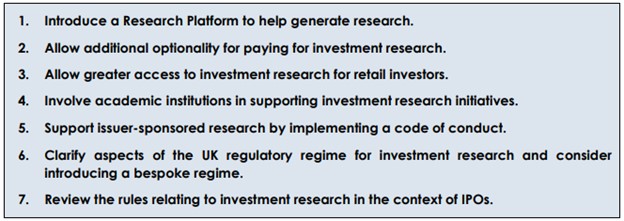Why Issuer-Sponsored Research Has Become a Priority in the UK (and US)
Why are the United Kingdom, The United States, and other countries providing an atmosphere that helps promote company-sponsored research?
Last year the SEC issued a report that was required by Congress on issues affecting the investment research of small companies. Last week the UK accepted, in its entirety, a recommendation on issuer-sponsored research. Both countries recognize the needs of investors, issuers, and the overall economy. Investors and issuers ought to be particularly interested in these changes and how they’ll improve the financial system.
Investment Research
Research is like the grease in the capital markets that keeps money from being stuck. It can be categorized into three types: sell-side research, buy-side research, and independent research.
Sell-side research is provided by full-service broker-dealers for clients to consume.
Buy-side research is created by institutional money managers for in-house use to help them make investment decisions on the money they manage.
Independent research is provided by firms that are neither broker-dealers nor institutional money managers, this service is paid for by investors or at no cost to investors as the company that has issued the security has sponsored the analysis.
Analysts often specialize in a specific industry and will regularly provide research on companies within that industry. This research includes written reports that discuss market developments, financial projections, target prices, and overall ratings or recommendations (such as buy, hold, or sell). The specific content and terminology used in research reports will vary.
These research reports can be published at any time, especially in response to important corporate events like earnings releases. While sell-side and buy-side research may have limited distribution, independent research is more widely available to money management firms and individual investors.
Research helps investors gain clarity about a company and its prospects. It can provide interpretations of significant events related to the company, such as media coverage or predictions from other analysts. Individual investors can also benefit from research reports by using them as part of their overall investment decision-making process.
In addition to producing written research reports, research providers may also assist issuers by arranging meetings or conference calls between investors and the senior management of companies. These roadshows help allow better understanding and communication between investors and the companies they may be interested in.
Overall, research is essential in the capital markets, it provides valuable information and insights that help investors make informed decisions about their investments. It helps reduce uncertainty and allows investors to assess the potential risks and rewards associated with different investment opportunities.
Analysts can also introduce or express their opinions about specific of covered companies using other forums such as video interviews, print media, or investor/issuer conferences. Additionally, sell-side analysts who work for broker-dealers that offer investment banking services may, within regulatory guidelines, be involved in investment banking transactions.
Benefits to Issuer
Research helps investors by discovering and delivering important information about companies. Well-rounded investors consider research an important part of the information they use to make investment decisions, including staying up to date on analyst forecasts for the company and industry, management forecasts, earnings announcements, and SEC filings. This fosters improved liquidity, which benefits price discovery and execution on demand.
According to the Congressionally mandated SEC report titled Staff Report on the Issues Affecting the Provision of and Reliance Upon Investment Research Into Small Issuers, research coverage of a company positively affects the liquidity of its stocks. When a company loses analyst coverage, its stock liquidity can decrease. This decrease in liquidity is more pronounced for smaller companies with fewer analysts covering them. Research coverage also helps investors recognize and pay attention to companies, which affects their value. Investor attention can be gained by engaging research and analysis firms to initiate coverage to gain investor attention.
Excerpt from the Securities and Exchange Committee Report, February 2022, (page 11):
“Studies have shown that research coverage of an issuer is positively related to its stock liquidity and that a reduction in research coverage of an issuer may reduce its stock liquidity. For instance, one study found that issuers that lose analyst coverage for at least one year suffer a ‘significant deterioration in bid-ask spreads, trading volumes, and institutional presence.’
Other studies have found that the reason for this deterioration is that decreases in analyst coverage increases information asymmetry, which can cause issuers to switch to financing that is less sensitive to information asymmetry, including decreasing their use of equity and long-term debt, or cause issuers to decrease their total investment (e.g., capital, research and development and acquisition expenditures) and financing. This decline in liquidity was shown in one study to be more significantly pronounced for smaller issuers, issuers with relatively less analyst coverage, and issuers with a bigger increase in information asymmetry resulting from the loss of an analyst.”
According to the SEC report, research analysts also serve as a comfortable third-party mechanism by monitoring a company’s management. Their scrutiny increases transparency and makes it harder for managers to engage in self-dealing activities. Analysts monitor financial statements, ask questions during earnings announcement conference calls, and distribute information to investors, helping detect any misconduct by management.
When a company loses analyst coverage, according to an SEC review, markets anticipate an increase in agency costs, such as the misuse of cash reserves by managers. The number of analysts covering a company is related to the compensation of chief executive officers and the likelihood of value-destructive corporate acquisitions. Decreased analyst monitoring is also associated with increased earnings management by companies.
The UK Goes All In
On July 10, 2023, the UK formally announced they are on a mission to improve capital markets. A large segment of the new, self-imposed mandate includes the consensus that investment research is an important part of the UK public capital markets and that the availability and quality of expert analyst research is significant in attracting (and retaining) issuers and investors. The Chancellor of the Exchequer is adopting seven action items aimed at “protecting and developing the UK as a centre of excellence for investment research.”
The report states that introducing a research platform to help generate research would help improve research coverage and would help promote a greater interest in smaller cap companies where there is currently a scarcity of research coverage.
The plan is to allow additional optionality for paying for investment research. And would address some of the unintended consequences of the MiFID II unbundling requirements, this aims to increase choices regarding payment for research to permit asset managers to pay for research on a bundled basis and to ensure that UK investment managers remain able to procure research from elsewhere, particularly from the US.
Retail investors have always been at a disadvantage, the UK mission supports greater access to investment research for retail investors, helping to level the playing field.
In developing a research platform open to all, the UK wishes to involve academic institutions and explore situations to strengthen the collaboration between universities and the capital markets ecosystem.
By providing rules, boundaries, and guidelines, the UK believes it can support issuer-sponsored research by implementing a code of conduct.
The Uk wishes to clarify aspects of the UK regulatory regime for investment analysis or better define it to help simplify access to investment research.
And the last on the UK’s “To Do” list is to review the rules relating to investment research in the context of IPOs with the following points to consider:
- Changing the FCA Conduct of Business Rules, introduced in 2018, designed to encourage unconnected research analysts to produce research in connection with IPOs. These rules have not had the desired effect of increasing IPO coverage by unconnected analysts but have consequentially extended the UK IPO timetable, putting the UK at a competitive disadvantage.
- Making IPO-connected analyst research available on a basis similar to the prospectus so that all investors can access the same information.
- Lower the current restrictions on analysts meeting potential IPO candidates prior to an investment bank being mandated on the IPO are also seen as putting the UK at a disadvantage to other listing venues.
Take Away
Investor access to investment research is important to the capital markets system as it helps money to flow much more easily where needed. Offerings that are better understood and have an additional layer of third-party oversight can attract more needed capital. This reality has been echoed by the SEC and the UK regulatory bodies.
Third-party investment analysis particularly helps smaller companies that may be less understood, as studies show, research coverage improves liquidity among small cap stocks. Investors, particularly retail, benefit from unbiased research and are more likely to make decisions on companies they believe they have a firm understanding of.
All in all, the UK and US authorities understand research provides valuable benefits to investors and the market as a whole. It enhances stock liquidity, increases investor recognition of companies, and serves as an external governance mechanism by monitoring and deterring managerial misconduct.
To have free access to small and microcap company research from the veteran equity analysts at Noble Capital Markets, sign-up here. If you are responsible for the investor relations of a company that may benefit from well-respected coverage, please contact Channelchek here for more information on company-sponsored research.
Paul Hoffman
Managing Editor, Channelchek
Sources
https://www.cfainstitute.org/-/media/documents/code/other-codes-standards/analyst-issuer-guidelines.ashx
https://www.sec.gov/files/staff-report-investment-research-small-issuers.pdf
https://assets.publishing.service.gov.uk/government/uploads/system/uploads/attachment_data/file/1168719/UK_INVESTMENT_RESEARCH_REVIEW_-_RACHEL_KENT_10.7.23.pdf
https://www.lexology.com/library/detail.aspx?g=d36aa9a5-d058-4ddc-93d1-ef430dbe3fe7




